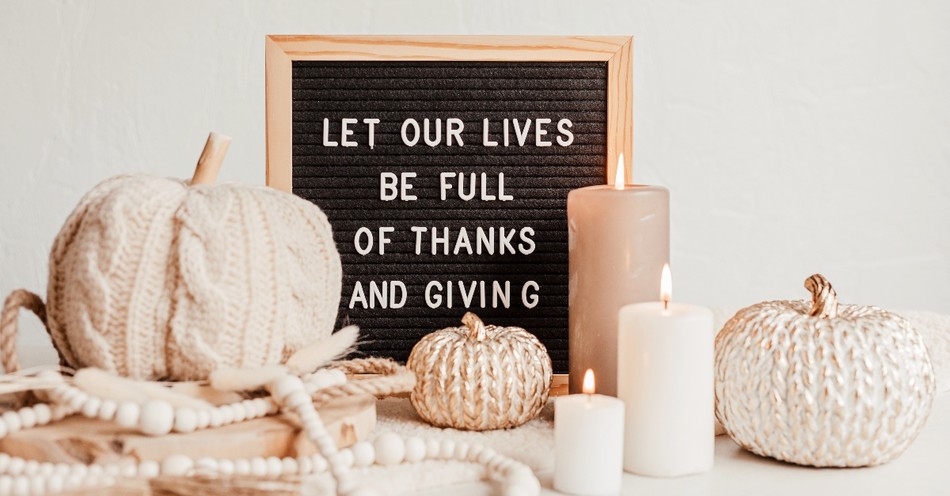Ruth may just be one of my favorite books in the Bible. I love it because it encases love, loyalty, forgiveness, and a heart of thankfulness.
While her story has a rather harsh and brutal beginning, we see an unveiling of God’s grace, mercy, and love tucked within those four chapters, holding a sweet message of hope.
So, what can we learn from Ruth and her heart of gratitude?
Oh, so much! Ruth's story provides us with the opportunity to reflect on our own lives, especially during a season that calls for us to be filled with gratitude!
Let’s take a deeper look and see what we can glean from the Book of Ruth, and better yet, how we can follow her beautiful example of cultivating a heart of gratitude as we head into this special holiday season of Thanksgiving.
Gratitude of Ruth in the Bible
Ruth’s story begins with loss and uncertainty. She was a Moabite woman who married into an Israelite family, only to face the devastation of becoming a widow at a young age. Rather than returning to the familiarity of her homeland, Ruth chose loyalty and faith by staying with her mother-in-law, Naomi, and journeying to Bethlehem.
This decision positioned her within God’s greater plan—she later became the great-grandmother of King David and part of the lineage of Jesus Christ. Her story is remarkable not just for her obedience but for the gratitude she demonstrated even in the midst of grief, displacement, and hardship.
Ruth’s heart of gratitude shines as a reminder that thanksgiving is not dependent on circumstances, but on trust in God’s faithfulness. Despite facing poverty, uncertainty, and cultural barriers, she found joy in the small provisions God gave.
1. Ruth Did Not Let Her Past Define Her
Let’s start from the beginning in Genesis 19:30-28. After the escape from Sodom and Gomorrah, Lot (the nephew to Abraham) and his two daughters flee to a cave outside the city of Zoar.
Unfortunately, the two daughters devise a plan to seduce their father, get pregnant, and bear children. The oldest daughter has a son and names him, Moab, meaning “he is of my father.” The descendants of Moab reflect the sinful and incestuous beginnings.
Although Ruth was from the lineage of Lot, she quickly turned from that lifestyle when she met Naomi and married her son, Mahlon (Ruth 1:3-21).
While this marriage was strictly out of survival and necessity, even seen as forbidden and unlawful, a beautiful friendship blooms between these two unlikely women.
When Naomi decides to venture back home to Judah, Ruth bears her heart and with a desperate cry — pleads to go with Naomi (Ruth 1:16-18). It’s as if the nature of her soul is on the line as she wants so badly to become a new person and not be bound by the possible shame of her past.
We can almost get a sense of how thankful Ruth was when Naomi stopped urging her to stay and allowed her to join her back to her hometown. Ruth must have been grateful to get away from Moab, and possibly curious about Naomi’s God, desperate to learn more.
We, too, can be thankful that our past doesn’t define us, and that we have the chance to start new each and every day. There is so much freedom in that!
2. Ruth Exudes Loyalty with Boldness
As Ruth and Naomi take the long and treacherous trek “home,” we see a shift in Naomi’s demeanor.
Upon entering the city, Naomi is struck with grief, urging the people to not call her by her name, but by Mara, which means — (she thought) the Lord was bitter towards her (Ruth 1:20).
Ruth and Naomi had both lost so much and by this point of travel, must have been famished and weary.
Since it was the season of harvest, Ruth bravely set out to glean the crops from the fields to help care for Naomi.
While in the fields, she meets Boaz, who sees her virtue of kindness and hard work. She shows her thankful heart to Boaz when he allows her to glean from his fields (Ruth 2:10).
Naomi hears of this news and is overjoyed! So, she instructs Ruth to go meet him in the night at the threshing floor (a ground of space when treading grain takes place) and lay at his feet.
This image holds symbolic meaning for judgment as she is essentially surrendering herself to him and proposing marriage (Ruth 3:10-14). Whoa! Talk about bold! Yet, she listens to Naomi’s wisdom and does just as she is told.
Her loyalty to Naomi and boldness with Boaz led her to a happy ending! Boaz and Ruth have a son named, Obed, who was the son of Jesse, which falls into the lineage of David and the royal bloodline of Jesus (Matthew 20:30). There is so much to be thankful for!
We can cultivate a heart of thankfulness when we humble ourselves to meet the needs of others and allow others to meet our needs as well.
Maybe it is to be there for a friend who is grieving this Thanksgiving, as Ruth was for Naomi. Maybe it is to allow someone to help you this holiday season and learn to say “yes.”
Cultivating a heart of gratitude starts by choosing to be loyal to those in need and administering to their needs with grace, dignity, and love. All the while, opening your heart to receive the give of a servant-heart as well.
3. Ruth Embraces Redemption
Ruth could have easily given up and stayed in Moab, with her sister Orpah. But she chose to fight for the freedom that the God of Israel offered. She basically saw something different in Naomi and wanted a better life.
Her story begins with tragedy, turmoil, and hopelessness, with no bright future in sight (Ruth 1:1). The pain only piles on after the loss of her first husband. Yet, in the midst of her own pain, she takes the burden of Naomi’s anguish and sorrow, too.
Ruth’s honor paints a vivid picture of redeeming love. It gives us a glimpse of the way we can all love as Christ loves us — with our whole hearts. It also showcases the beautiful plan God has for all of us, to sanctify and redeem us!
Ruth’s story could have turned out so differently. Being a foreigner in the land of Israel, she could have been discriminated against and treated very badly, but God’s faithfulness kept her safe from harm.
God also placed Boaz, an honorable man, in her direct path allowing her to tend to the fields providing food for her and Naomi.
While her story is far from typical, it is quite impactful starring a seemingly ordinary woman, that suffered many trials but still became the start of a new era for Israel due to her faithfulness and loyalty. Her story ties into the reign of King David, and eventually leads to the lineage of our Savior!
God basically used Ruth, an outcast, foreigner, and commoner with an unmentionable past, to be used to fulfill a much greater purpose!
This should give us so much hope as believers! No matter what our situation is, no matter our past, or the sins we are currently wrapped up in — God can take our mess to create a much deeper message of hope. He can work all things out for good!
A Prayer to Cultivate a Heart of Gratitude
Gracious God, we can not even begin to thank You for all that You have done. From the sacrifice on the cross to the minute details You orchestrate and take care of in our lives. You are so good to us!
As we head into a beautiful season that calls us to give thanks, we ask that You help us cultivate a heart of gratitude. Give us the freedom to let go of our past.
Grant us the ability to live with boldness, show loyalty with a servant's heart, and help embrace the precious gift of Your mercy and grace. Amen.
For further reading:
What Is the Story of Ruth in the Bible?
What Is the Story of Ruth and Naomi?
What Does Gratitude to God Look Like?
Photo Credit: ©iStock/Getty Images Plus/netrun78





